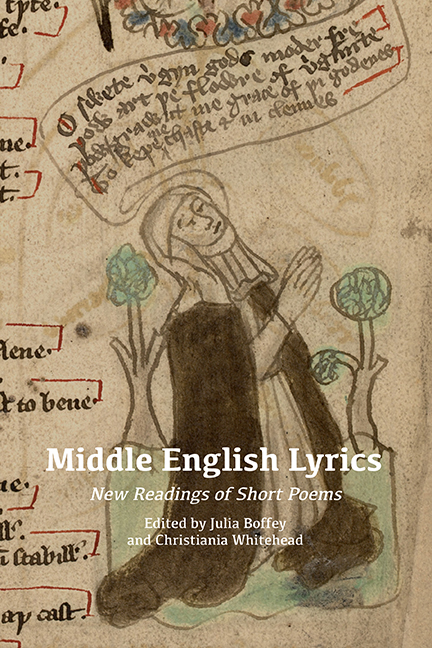Book contents
- Frontmatter
- Dedication
- Contents
- List of Illustrations
- List of Contributors
- Acknowledgements
- Abbreviations
- Introduction
- 1 Editing Issues in Middle English Lyrics
- Part I Affect
- Part II Visuality
- Part III Mouvance, Transformation
- Part IV Words, Music, Speech
- 15 All Adam's Children: The Early Middlez English Lyric Sequence in Oxford, Jesus College, MS 29 (II)
- 16 Musical and Poetic Form in Stond wel, moder, under rode
- 17 Tutivillus and the Policing of Speech in Oxford, Bodleian Library, MS Douce 104
- 18 Have This in Mind: Word and Image in Audelay's Writing
- 19 ‘The Dance of the Intellect among Words’: Wyatt's In eternum and Late Medieval Lyric Practice
- Afterword: The Study of Medieval Lyrics in 1960s Oxford and Today
- Bibliography
- Index of Manuscripts
- General Index
18 - Have This in Mind: Word and Image in Audelay's Writing
from Part IV - Words, Music, Speech
Published online by Cambridge University Press: 23 July 2019
- Frontmatter
- Dedication
- Contents
- List of Illustrations
- List of Contributors
- Acknowledgements
- Abbreviations
- Introduction
- 1 Editing Issues in Middle English Lyrics
- Part I Affect
- Part II Visuality
- Part III Mouvance, Transformation
- Part IV Words, Music, Speech
- 15 All Adam's Children: The Early Middlez English Lyric Sequence in Oxford, Jesus College, MS 29 (II)
- 16 Musical and Poetic Form in Stond wel, moder, under rode
- 17 Tutivillus and the Policing of Speech in Oxford, Bodleian Library, MS Douce 104
- 18 Have This in Mind: Word and Image in Audelay's Writing
- 19 ‘The Dance of the Intellect among Words’: Wyatt's In eternum and Late Medieval Lyric Practice
- Afterword: The Study of Medieval Lyrics in 1960s Oxford and Today
- Bibliography
- Index of Manuscripts
- General Index
Summary
Despite recent work by Susanna Fein and others, Audelay and his writing remain relatively unfamiliar. His poems survive in a single manuscript, Oxford, Bodleian Library, MS Douce 302, which was produced during Audelay's lifetime (c.1426–31) at the Augustinian Haughmond Abbey, where he was a priest in the Lestrange chantry. It consists of four main parts: a collection of poems under the title The Counsel of Conscience, a series of ‘salutations’, a collection of carols, and what Fein describes in her edition as a ‘meditative close’ to the manuscript as a whole. Although it is likely that not all poems in the manuscript are of Audelay's own composition, it is evidently a compilation that combines Audelay's own writing with that of others in a highly purposeful way. The paratext repeatedly emphasises Audelay's close association with the manuscript; within the lyrics, too, he is frequently named, and the final colophon includes a prayer for his soul. He is thus among a relatively small number of fifteenthcentury authors who seek systematically to attach their name to their work. Focusing primarily on The Counsel of Conscience, this chapter will argue that he is also among those whose writing constitutes a practical poetics: that is, among those whose views on poetry are both governed by their experience of writing and expressed through their poems. Specifically, it will suggest that his view of poetry as spiritual instruction is reflected in the form as well as the content of his lyrics.
Although Audelay is closely associated with Douce 302, the manuscript is not a holograph; it was written by two scribes at the abbey, very possibly because Audelay himself was blind. This is of more than incidental importance; the epithet ‘blind’ is used of him so consistently that it effectively becomes part of his name. As a result, his frequent association of blindness with spiritual failings, as in Marcolf and Solomon (lines 298, 629) and the Epilogue to The Counsel of Conscience (line 381), has a particular resonance; there is a strong implication that Audelay's own blindness is a punishment for the sins of his youth. Yet Audelay's condition also allows him to define himself as a seer: one whose lack of physical sight enables his spiritual vision.
- Type
- Chapter
- Information
- Middle English LyricsNew Readings of Short Poems, pp. 251 - 260Publisher: Boydell & BrewerPrint publication year: 2018



